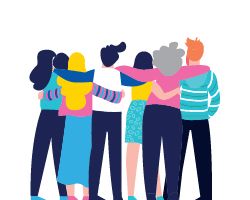Health library
Back to health libraryHow to help someone with an eating disorder

Here's what you can do for a friend or loved one whose food habits worry you.
You're worried because your daughter rarely eats and has become painfully thin. Or your friend pops diet pills and often disappears into the bathroom after lunch at school. These may be signs of an eating disorder. You can help-but it must be the right kind of help.
First, understand that you can't solve the problem. An eating disorder is a serious medical and psychological condition that requires professional diagnosis and treatment.
Second, understand that you cannot force someone to get help or to change habits or attitudes. Only he or she can do that, and it's usually a long and difficult process.
What you can do
Prepare yourself. Learn as much as you can about eating disorders. Then think about specific times and places you have seen the person do things that might indicate a problem and why they concern you.
Choose a time and place. Approach the person at an appropriate time in a safe environment. Don't try to talk when the person is in the middle of behaving in the way that worries you. Instead, note it for later. Meet face-to-face in a private place so you both can be open and honest and so emotions, such as anger or crying, can come out.
Have the talk. Discuss what you have learned from your research and detail your observations. But be sure to express your concern rather than accusing the person of a problem.
Use "I" statements instead of "you" statements. Say, "I'm worried that you don't seem to be eating well," rather than, "You never eat."
Encourage the person to see a counselor, doctor or nutritionist and offer to go along. Steer him or her toward resources. Some possibilities:
- The National Eating Disorders Association toll-free line for people with eating disorders and their friends and family, 800.931.2237.
- National Association of Anorexia Nervosa and Associated Disorders.
- Academy for Eating Disorders.
- National Institute of Mental Health.
- Academy of Nutrition and Dietetics.
Expect defensiveness and denial. The person may be embarrassed or angry at being confronted and may deny having a problem. You need to be a good listener, but if the person won't listen to you, it's important to accept that. Don't argue or push, but tell him or her you'll be there if he or she wants to talk.
Follow up. After you've approached the person, it's OK to point out behaviors that worry you as they occur. But be sure to continue to act with compassion and empathy.
If the person is young, you may need to seek help from a trusted adult such as a parent, teacher or counselor. But first make him or her aware that you plan to do this.
Take care of yourself. Be patient and try not to get frustrated. You may feel helpless, enraged or hopeless, but you need to vent these emotions elsewhere. See a counselor or join a support group yourself.
Also, be aware that you may become vulnerable and grow preoccupied with your own eating.
Don't give up. People who have recovered from eating disorders say it makes a difference when friends and family members keep trying to get through to them.
Reviewed 1/22/2025
